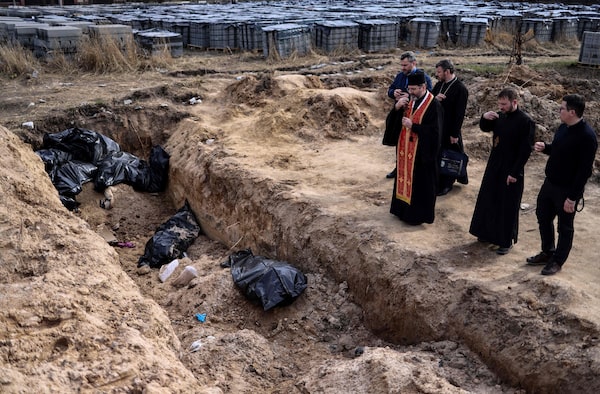Vladimir Scherbinin, left, head of Bucha Guard paramilitary group, and deputy Mayor Taras Shapravskyi commemorate Volodymyr Kovalskyi, who died in the battle for Bucha on Feb. 27.ANTON SKYBA/The Globe and Mail
Ludmila Sikorska broke out into a smile as she unlocked the door of the small shop she runs on the ground floor of a battered apartment building in Bucha.
The five-storey building bears the scars of the brutal conflict that raged in this Kyiv suburb for a month when Russian troops occupied the city and then Ukrainian forces reclaimed it. There’s a giant hole in the wall on the top floor and rows of windows have been shattered. Seven cars sit in the outside courtyard, five burned almost beyond recognition and two riddled with bullet holes.
Much of the building next door, where Ms. Sikorska grew up and where her mother lived until just after the Russians arrived, is black with soot and pockmarked by shrapnel.
Ms. Sikorska, 42, has emotional scars too from the occupation. She spent 19 days in the basement of her house in a neighbouring village with her husband and four-year-old son. They fled after their neighbour was beaten to death by Russian soldiers. Her mother managed to leave town just before the apartment building was destroyed.
This week, Ludmila Sikorska reopened her shop for the first time since the war started. She’s welcoming back many of her regular customers already.ANTON SKYBA/The Globe and Mail
But now Ludmila is back, determined to prove that Bucha can rebuild and that this city’s legacy won’t be the horror story that the world has come to know. She reopened the shop for the first time this week since the war started, and she’s once again welcoming many of her regular customers.
“Step by step, we are coming back,” she said as she looked around the tidy shop that has a small Ukrainian flag over the counter. “I will never leave this place. This is the place of my childhood.”
All across Bucha, there are similar signs of renewal. Nearly 90 per cent of the city’s residents left town during the occupation but many have begun to return. More shops are reopening, streets are starting to hum with traffic, and public utilities – including electricity, water and sewage – are slowly returning to normal. City workers have even started planting flowers in a local park and two street cleaners ply the roadways.
Volodymyr Tsabal, the local member of parliament, visited Bucha for the first time in a week on Friday and couldn’t believe the transformation.
“Seven days ago when I came here, it was a bit deserted. Now, I come here and there are a lot of people on street and some shops are open. I went to my favourite bakery which was closed before,” he said in an interview in Bucha’s City Hall. “It kind of brings some hope when you see these small things.”
Next door to the municipal offices, in another badly damaged apartment building, Olha Zvonok has been going non-stop since she reopened her tiny café, called Coffee, nearly two weeks ago.
Top: City officials say 70 per cent of the buildings have suffered at least some damage, and 1,200 are either totally or partly destroyed. Below: humanitarian aid is distributed to Bucha residents in need of support during the rebuilding process.ANTON SKYBA/The Globe and Mail
“I was thinking that no one would come,” she said Friday between taking orders from a line of customers. “I am really surprised.” The response has been so positive that she’s keeping the café open seven days a week from 8:30 a.m. to 6 p.m., and staffing it by herself.
But even with the renewed optimism, the harsh realities of life under Russian occupation are never far away.
How Ukraine’s tech talent joined the resistance against the Russian invasion
Russian missiles target Lviv, a major transfer point for Ukraine’s weapon supplies from Poland
In normal times, Bucha – which has a population of around 40,000 – looks like any middle-class suburb in North America, with its gleaming high-rise condominiums, shopping malls and tree-lined streets.
Now, it’s hard to find a building that hasn’t been affected by the war. City officials say 70 per cent of the buildings have suffered at least some damage and 1,200 are either totally or partly destroyed. Roughly half the streets are also in need of repair.
And then there’s the dead.
Officials say 416 people died in Bucha and the surrounding villages during the Russian occupation, which lasted from Feb. 27 to March 31. But that figure keeps rising and dozens of corpses have yet to be identified.
Mykhailyna Skoryk, an advisor for the mayor of Bucha, is collecting data from different sources to calculate the death toll of the conflict.ANTON SKYBA/The Globe and Mail
“This week, we have no new bodies but last week, we found another mass grave with three bodies,” said Myhailyna Skoryk an adviser to Bucha’s mayor who’s leading the effort to identify the dead. All three men showed signs they’d been executed, she added.
“I suppose that next week, we could find one, two or three. You never know because people are coming back, they are checking yards, they are checking flats, they are checking basements and they might find somebody else. So this figure is not final.”
Ms. Skoryk’s work involves painstaking searches through records – electronic and paper – from multiple sources. “I deal with puzzles,” she said. “Our system was not prepared for such a big amount of bodies.” Officials in France are helping with some DNA testing that she hopes will help speed up the identification process.
When asked how she copes with such difficult work, she pointed to a long list of unidentified corpses on her computer and replied; “It’s exhausting but it’s a job. I don’t want to comment and to explain. I have to finish that.”
The city has promised to bury all the dead, a grim task that falls to Serhii Mastipaka, the head of Bucha’s municipal services. “The city made a decision that everyone who died during the occupation is to be buried for free,” said Mr. Mastipaka. “It’s part of our job.”
He was among a small group of people who collected bodies off the streets during the occupation and while Russian troops retreated. “The Russians wouldn’t bury them,” he said.
ANTON SKYBA/The Globe and Mail

Above: The city of Bucha couldn't estimate the losses from the conflict, so they were forced to stockpile coffins in advance. Below: Priests pray for those killed in the battle of Bucha at a mass grave dug in the garden of St. Andrew’s Church.RONALDO SCHEMIDT/AFP/Getty Images
With no other option, Mr. Mastipaka and the others buried as many as they could in a mass grave at St. Andrew’s church in the hope that when the war ended, the bodies could be exhumed, identified and properly buried. That’s what’s happening now, and inside his municipal work yard, next to the forklift and the fire truck, Mr. Mastipaka keeps a stack of coffins.
Across town, Oksana Dzham, who heads the health care centre, has been doggedly reopening local clinics and pushing to get pharmacies back in operation. She’s set up a makeshift drug dispensary at a school and teams of doctors meet patients to prescribe medicine. Her biggest challenges now are getting the health system’s computer network back online and restocking the community clinics that were nearly all ransacked by Russian soldiers.
She’s also worried about how Bucha’s residents are coping with what happened. An estimated 3,700 locals stayed in the city throughout the occupation and many witnessed horrific cases of murder, torture and sexual assault as Russian soldiers took over houses.
Specialists from Médecins sans frontières (Doctors Without Borders) have volunteered to train medical staff on how to treat mental-health issues, but Ms. Dzham believes the fallout from the war will take years to overcome.
“Everyone was impacted,” she said. “If you even think that you are resilient and you don’t have depression, it doesn’t mean it won’t happen and it comes very fast.”
She too couldn’t stay away from Bucha. She left the city early in the war and returned on April 4, five days after the Russians withdrew and while Ukrainian military crews were clearing away mines. She’s still struggling to find enough medicine and basic medical equipment – like ear and eye scopes – but she can’t imagine doing anything else right now.
“It’s normal to stay in your town and serve your community,” she said as tears welled in her eyes. “It’s impossible to do it another way because we are Ukrainians.”
A municipal vehicle sweeps a street in Bucha as a jogger passes. Some residents worry that people have become complacent about the war and are returning to the town too quickly.ANTON SKYBA/The Globe and Mail
There are those in town who worry that people have started to become complacent about the war. “People are coming back too fast,” said Vladimir Scherbinih, 67, who heads the Bucha Guard, a local military outfit. “The rebuilding is too fast.”
Mr. Scherbinih was among the soldiers who battled the Russians when their tanks first entered the city on Feb. 27. He lost a friend in the fighting and got shot three times; in the knee, abdomen and arm. He spent seven days in the Bucha hospital terrified that Russian soldiers would find him. When a group of soldiers entered the building, a doctor told them that Mr. Scherbinih was a civilian.
The lie saved his life and Mr. Scherbinih managed to be evacuated to a hospital in Kyiv where he spent several weeks recuperating.
He returned to Bucha this week and on Friday he helped bury his friend – 36-year old Volodymyr Kovalskyiin – in the city’s cemetery. He marvelled at the changes taking place in Bucha but worried that the Russians will come back and that the city won’t be prepared. “I live in Bucha. I will defend Bucha,” he said.
Whatever the fears about another attack, there seems to be little in Bucha right now that will dampen the hope of life-long residents such as Artem Yasmchenko.
He returned to the city last week after fleeing the fighting in early March with his two young sons. Now, he wants to be part of the rebuilding process and put his skill as an architect to work on new road designs.
“We came back to restore our city,” he said. “Bucha must be back and be better. We have many ideas how to do it.”
Our Morning Update and Evening Update newsletters are written by Globe editors, giving you a concise summary of the day’s most important headlines. Sign up today.
 Paul Waldie
Paul Waldie